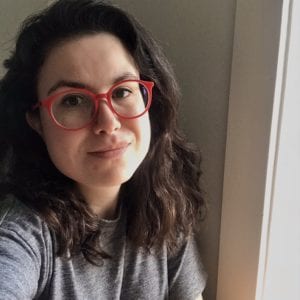Four amazing new interns have joined the Press this summer—remotely, from around the country—and it’s our pleasure to introduce you to each of them here. We’ll share their 60-second Q&As every #MeettheInternMonday in the coming weeks, so check back!
P.S. Interested in an internship with us in Fall 2024? Applications are due July 1st.
Meet Lucia
 CCP: What’s your favorite aspect of the intern experience at Copper Canyon Press so far?
CCP: What’s your favorite aspect of the intern experience at Copper Canyon Press so far?
L: I feel lucky to see such a passionate group of people committed to poetry and its place in the world. The devotion Copper Canyon Press holds towards poetry is evident in the little things from the poetry lines in staff email signatures to offerings of poem titles in Zoom chats, to poetry readings at the beginning and end of each meeting. It’s always in the air. Behind everything that’s done at the press, it’s clear that poetry is the point.
CCP: Please tell us about a forthcoming Copper Canyon title you’re excited about, and why.
L: I am excitedly awaiting Jenny George’s After Image coming in October 2024. I love the complexity of George’s narratives and how her poems wind you up only to stay lingering at the end. I’m looking forward to seeing her poems explore the delicate threads between love and grief.
CCP: Please give us a line from a poem that you can’t get out of your head.
L: “so damn foolish / we have become beautiful without even knowing it.” — Billy Collins, Nightclub
Meet Emma
 CCP: What’s your favorite aspect of the intern experience at Copper Canyon Press so far?
CCP: What’s your favorite aspect of the intern experience at Copper Canyon Press so far?
E: Unsurprisingly, Copper Canyon Press is an organization of people who care fiercely about poetry and believe in its power to step into our lives and change us. I have felt the sincerity of this ethos in every aspect of my experience, from the way we talk and listen to one another to the care and delicacy with which the press addresses even the most minute details of the publishing process. I have especially enjoyed the opportunity to revisit the work of C.D. Wright and immerse myself in her strange and singular poetics.
CCP: Please tell us about a forthcoming Copper Canyon title you’re excited about, and why.
E: I am looking forward to Pádraig Ó Tuama’s forthcoming collection Kitchen Hymns. As a longtime reader of Pádraig’s work, I am in awe of his sensitivity to the word and spirit. I love how he draws on Biblical narrative and theology to reckon with the complexities of faith in our world.
CCP: Please give us a line from a poem that you can’t get out of your head.
E: The final line to Arseny Tarkovsky’s poem “My sight, which was my power…” translated from the original Russian by Philip Metres and Dimitri Psurtsev is a line I think of often: “To burn posthumously, like a word.”
Meet Holly
 CCP: What’s your favorite aspect of the intern experience at Copper Canyon Press so far?
CCP: What’s your favorite aspect of the intern experience at Copper Canyon Press so far?
H: I appreciate the ways the team at Copper Canyon Press recognizes and pushes against the constraints of centering poetry in a society that demands disposability and instant gratification. Everyone here believes in the value of poetry, in slowing down time, whether that is through sharing poems out loud at each staff meeting or taking a few extra days to perfect a forthcoming manuscript—asking an author if a particular comma should go after a noun or before it, if a word or line should be italicized. There is a collective understanding that the small things matter so much.
CCP: Please tell us about a forthcoming Copper Canyon title you’re excited about, and why.
H: As a long-time fan of Jennifer Chang’s work, it has been a tremendous honor to work on her upcoming collection, An Authentic Life. I love the cadences of her language, the way other voices meld with the speaker’s interior monologue, all of the images—the skies, the dust, the horses. Also, the book’s cover and color palette are so beautiful. I can’t wait to hold a physical copy.
CCP: Please give us a line from a poem that you can’t get out of your head.
H: Fady Joudah’s poem, “Mimesis,” from his collection Alight, is one that I think about on an almost daily basis. This is more than a line, but the entire poem resides in my mind: “My daughter / wouldn’t hurt a spider / That had nested / Between her bicycle handles / For two weeks / She waited / Until it left of its own accord // If you tear down the web I said / It will simply know / This isn’t a place to call home / And you’d get to go biking // She said that’s how others / Become refugees isn’t it?”